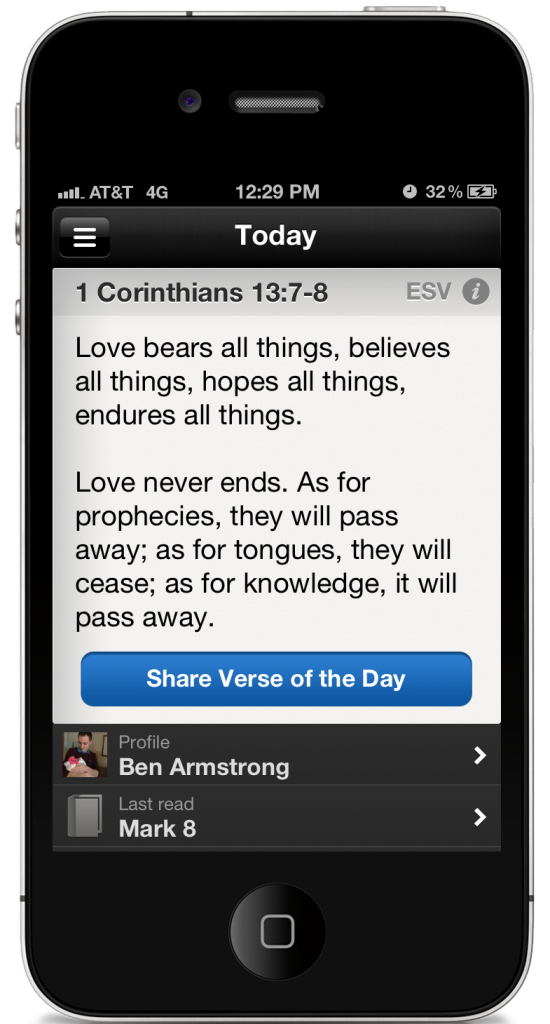For Lack of Discipline
I’m not a very disciplined person. I don’t exercise regularly (though I have a desire to). I don’t eat nutritionally unless my wife forces me to. I’ve never been one of those early-riser people who can “get so much accomplished” before the rest of the world wakes up. Nope, that’s not me and, to a certain extent, I’ve learned to be OK with that.

By: Wonderlane
A few years back, as I was beating myself up for not being disciplined enough, some words from a friend, coupled with what I believe were words from God, helped to change my perspective and get me on a track to being a fruitful human being again. You see, what I realized was that my definition of discipline was one that I had adopted from “disciplined” people. In other words, people who were not wired like I am had developed a system that worked for them and I thought that was the only way it could be done.
That’s where I was with the whole idea of daily Bible reading. Now, let me say that I don’t think that following Jesus means that you are required to read the Bible every day. Let me also say that I highly recommend it! But for a guy who sleeps as late as possible each morning and is typically pretty brain-dead by the end of the day, when was I supposed to have my “quiet time?”
Enter YouVersion.com – or more specifically, their Bible App for mobile phones. At first glance, the Bible App is nothing special. It’s a Bible on your phone. But this app enabled me to take my desire for daily Bible reading from fantasy to reality. How? By allowing me to insert my “quiet time” into my spare time.
Suddenly, any time I was waiting for someone before a meeting, standing in line, or taking a…um…break, I could break out my trusty Bible and read. For a guy like me, this was an incredible gift! No longer did I have to dedicate a certain time of day for study. I could read the Bible any time I wanted, anywhere I wanted.
What About the “Want To?”
I can guess what you’re thinking. “Any time I wanted,” indicates that I actually wanted to read the Bible. I know that’s a big hurdle for a lot of people. However, if you are in any way a competitive person, have I got great news for you. The Bible App brings out the competitive nature in us crazy human beings. In this case, I was competing with myself (a worthy competitor), nd I decided that if I was going to do this, I was going to go all-in. My very first Bible reading plan on the Bible App was Bible in 90 Days. Yes, that’s right, the whole Bible – all 1,189 chapters of it – in 90 days. It was the P90X of Scripture reading. I chose this plan because I reasoned that I could do anything for 90 days, even if I hated it.
Funny thing is, I didn’t hate it, even though it was incredibly hard. The thing that kept me going – that brought out that competitive nature in me and encouraged me to read 10-15 chapters a day – was the progress tracker that YouVersion has created. In a glance, you can see where you are in your reading plan and, if you get behind, where you should be. Additionally, if you get too far behind, you’ll get an email from the nice YouVersion system encouraging you to get back on track. It’s like having a personal trainer for your daily devotions.
That encouragement, combined with my competitive drive provided the spark for my “want to.” The richness of Scripture provided the fuel. Reading the Bible so quickly reminded me how it all really ties together. Suddenly, the arc of the grand narrative – a story about God and his people – was illuminated for me like never before. I began to thirst for the Bible.
The Next Steps
After completing my Bible in 90 Days reading, I decided that I might as well keep up the pace. I didn’t want to go all the way back to Genesis, so instead, I jumped into New Thru 30, my second reading plan, which took me through the entire New Testament in 30 days on about the same pace as its 90 day, whole Bible cousin.
After completing New Thru 30, I decided to slow down my reading, so as to absorb a little more of the micro, rather than just the macro. My next reading plan was the Canonical plan, which takes you through the Bible in a year. After doing the Bible in 90 Days and New Thru 30, reading 3 or 4 chapters a day seemed like a piece of cake. So, naturally, I decided to challenge myself again. That’s how the Bible in a Year Blog got started. Each day, having read the reading for the day from the Canonical reading plan, I would write several hundred words about that day’s reading.
A year later, I was finished. Over 180,000 words written about the roughly 775,000 words of Scripture. Needless to say, my words pack a lot less punch than those in the Bible. But it was a great exercise – this time fueled by the fact that I knew every day that I had people reading along with me. These same people would come to my blog to see what I had to say about that we read that day. I couldn’t let them down! And so I read and I wrote.
As 2012 became 2013, the Bible in a Year Blog got mothballed. It’s still there if you want to read it, but I had reached the end of yet another journey. So, what to do? I decided once again to slow down – to take in the words I was reading more deeply. For me, this meant slowing to a snail’s pace. I am now on the Read Through The New Testament plan, which takes me on a thoughtful journey through the New Testament over the course of a year.
I am supplementing my daily reading with additional reading from N.T. Wright’s wonderful “…for Everyone” series. [Amazon]. The series is available on Kindle, which works for me for the above-mentioned reasons, and serves as a great thought-provoking, but not too in-depth daily devotional. A month in and I’m still in Matthew, but I’m loving every minute of it.
A New Reality
Having reached this point in my journey, with daily Bible reading as a reality for me, I look back on myself just a couple of years ago. I was depressed about the fact that I wasn’t reading the Bible regularly. To do so seemed like an impossible task – a fantasy. If I had tried to get up early and read even one chapter a day, I would have probably given up after a couple of weeks. But through the use of a tool that was made for people wired like me, combined with a 90 day, intense personal challenge that kick-started my journey, I was able to take the idea of daily Bible reading from fantasy to reality.
I am thankful every day for the words I read in the Bible. Through my reading, I am encouraged, challenged, educated and healed. No other book could do that. No other discipline could do that. I’ve learned to see the Bible not as an instruction book or a text book, but as a true gift of life – Jesus, the Word of God, captured in print. It is my sincere prayer that you will be encouraged to embark on a similar journey. It may look different for you (remember, my greatest mistake was thinking I had to do it like others had done it), but I know you can make daily Bible reading a reality for you, too.



